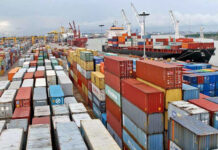The Asian Development Bank (ADB) will lend Tk 1,233 crores to Bangladesh to enhance its efficiency in international trade. To accelerate the growth of the country, Bangladesh will be able to utilise this loan in sectors such as forecast capability and security improvement.
This information was given in a report published by the organisation on Thursday (31 March). It called for improving the quality of exports to Bangladesh and increasing the capacity for signing bilateral trade and investment cooperation agreements.
In addition, further coordination between the border agencies and the private sector in the implementation of trade facilitation strategies to increase export diversification and competitiveness has been mentioned.
Tadateru Hayashi, ADB’s chief economist, said that the ADB’s assistance will support the government’s goal of accelerating economic growth through industrialisation and trade. In addition to helping to diversify export products and destinations, the program will facilitate trade and commerce between South Asian allies through improved communication.
The ADB assistance includes a policy-based loan of Tk 776 crores, which can be used for various reforms including upgrading the country’s customs legal framework to international standards, improving the cargo clearance process, and strengthening the powers of the National Board of Revenue (NBR) and the Ministry of Commerce.
Apart from this, integrated land customs stations and land ports will be constructed at the border of Akhaura, Sonamasjid, and Tamabil at a cost of Tk 457 crores through the Bangladesh Land Port Authority (BLPA) and NBR. Supplementary equipment will be installed for improved customs clearance and cargo transportation.
ADB will provide technical assistance of Tk 129 crores from the Special Technical Assistance Fund, which will be used for modernisation of customs legal framework and effective planning of central customs facilities in coordination with border agencies. It will strengthen the capacity of NBR to implement sophisticated customs activities at the borders as well as increase the capacity of NBR and land port authorities to implement projects.




